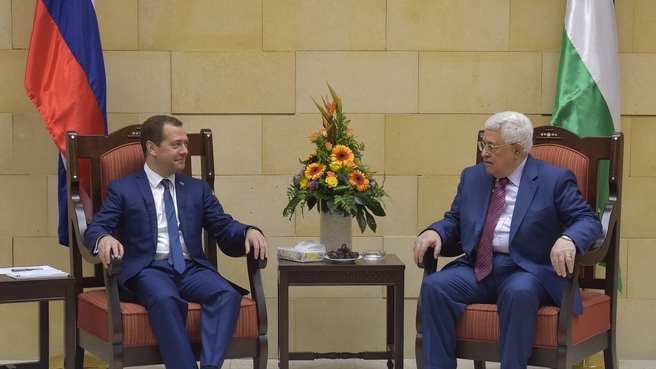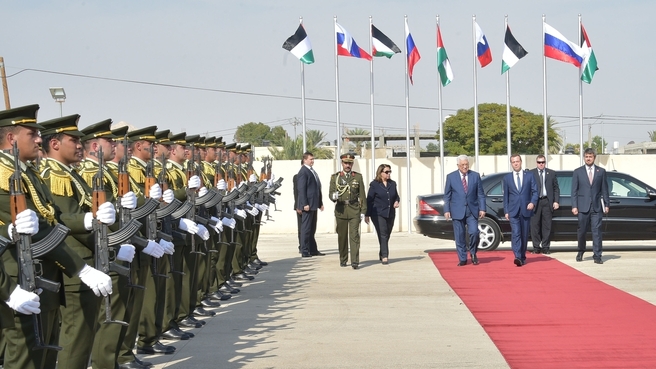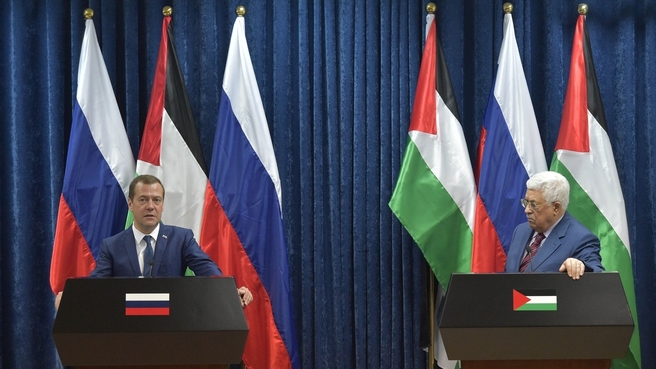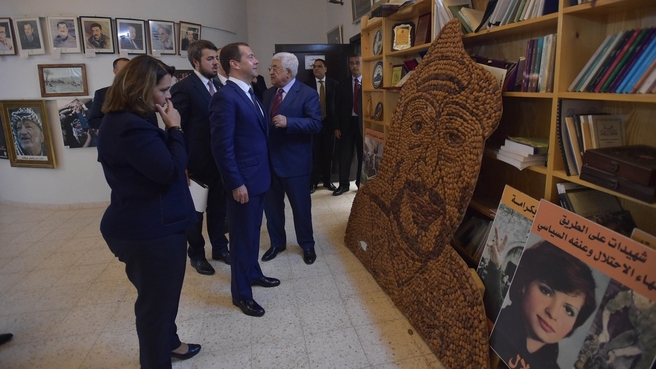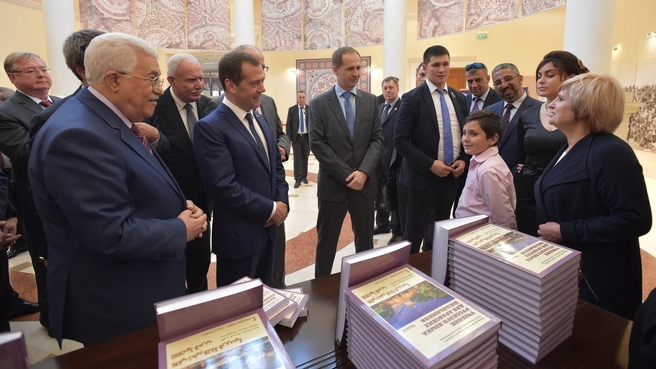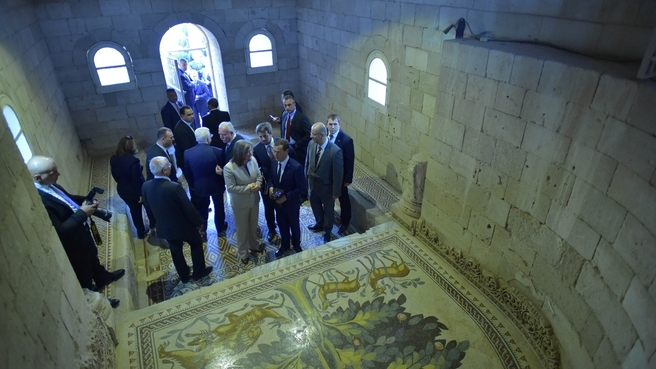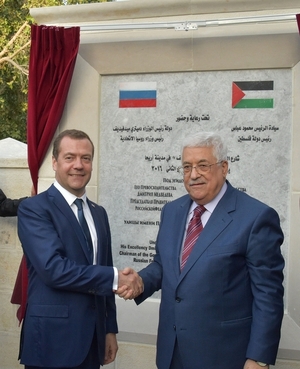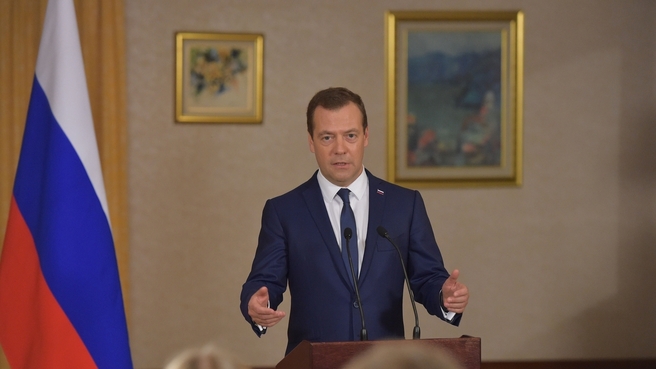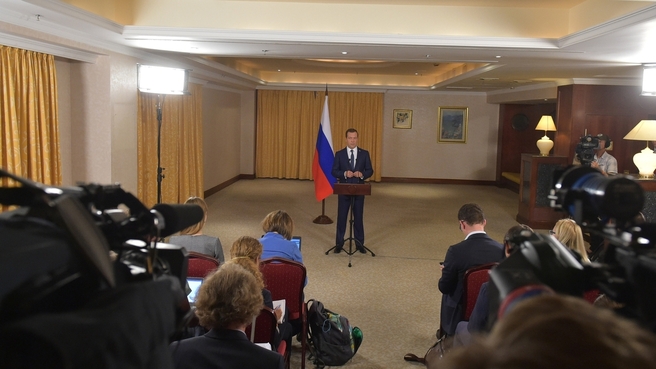The officials discussed economic and humanitarian cooperation between the two countries, as well as issues pertaining to Palestinian-Israeli dialogue and ways of ensuring security in the Middle East.
Joint news conference by Dmitry Medvedev and Mahmoud Abbas
Documents signed following the talks:
Agreement between the
Government of the Russian Federation and the Government of the State of
Palestine on mutual encouragement and protection of capital investment
Signed by: Deputy Minister of
Economic Development of Russia Alexei Gruzdev and Minister of National Economy
of Palestine Abeer Odeh;
Plan of Cooperation between
the Russian Federation and the State of Palestine in occupational safety and
labour hygiene, employment and vocational training for 2017-2018 within the
framework of the Memorandum of Understanding and Cooperation in Labour and
Employment between the Ministry of Labour and Social Protection of the Russian
Federation and the Ministry of Labour of the State of Palestine
Signed by: Minister of Labour
and Social Protection of Russia Maxim Topilin and Minister of Labour of
Palestine Ma’moun Abu Shahla;
Joint Statement by the Minister
of Culture of the Russian Federation and the Minister of Culture of the State
of Palestine on Days of Russian Culture in Palestine and Days of Palestinian
Culture in Russia in 2016-2017
Signed by: First Deputy Minister
of Culture of Russia Vladimir Aristarkhov and Minister of Culture of Palestine
Ehab Bseiso;
Agreement on Cooperation
between the Chamber of Commerce and Industry of the Russian Federation and the
Federation of Palestinian Chambers of Commerce, Industry and Agriculture
Signed by: Chairman of the
Board / President of the Russian Chamber of Commerce and Industry Sergei
Katyrin and President of the Federation of Palestinian Chambers of Commerce,
Industry and Agriculture Khalil Rizq;
Memorandum of Understanding
between the Russian Association of Clusters and Science Parks and the Palestinian
Industrial Estates and Free Zones Authority
Signed by: Director of the
Russian Association of Clusters and Science Parks Andrei Shpilenko and Minister
of National Economy of Palestine Abeer Odeh;
Memorandum of Understanding
between Special Economic Zones (RusSEZ) and the Palestinian Industrial Estates
and Free Zones Authority
Signed by: Director of Project
Management and Investor Relations Department at RusSEZ Yevgeny Avtushenko and CEO
of the Palestinian Industrial Estates and Free Zones Authority Ali A. Shaath.
Joint news conference by Dmitry Medvedev and Mahmoud Abbas
Excerpt from the transcript:
Mahmoud Abbas (via interpreter): Mr Prime Minister of the friendly nation of the Russian Federation, Mr Medvedev, welcome to Palestine as our dear guest and friend. We are thrilled to welcome you to Jericho, a town with an ancient history, which our Russian friends pay a lot of attention to and provide us with assistance in various areas. It is with deep pride that we note that our countries have historically friendly relations. We look forward to further strengthening them based on Russia’s political support for resolving the Palestinian issue through various international forums, thanks to mutual visits, including at the highest level, continued work of the intergovernmental commission, and implementation of the agreements that have been signed earlier and the ones signed today, and our joint projects.
We have a special relationship. In this regard, we very much appreciate the effective role played by the Imperial Orthodox Palestine Society headed by our friend, Sergei Stepashin. Also we are very proud of the relationship that we have with the Russian Orthodox Church and Patriarch Kirill.
My dear friend Mr Medvedev, special thanks go to you for Russia’s funding of the renovation of Jericho’s historical centre. In this regard, you and I will soon hold a grand opening of a street named after you.
I took the opportunity of meeting with Mr Medvedev to describe the plight of the Palestinian people amid the continued occupation of the State of Palestine by Israel, the ongoing settlement activity which undermines the foundations of a peaceful solution, and the continued practice of changing the status of the city of Jerusalem, which undermines the foundations of its life. We believe that Jerusalem must be open to representatives of all three Abrahamic religions.
Of course, we are ready to make peace with Israel by decision of both states and subject to compliance with all internationally recognised resolutions, and also based on the Arab Peace Initiative. We keep saying that we are ready to recognise Israel as a state, but it should not be a one-way street. We also discussed an international peace conference to be held in France later this year, and talked about the Russian President's proposal to hold a trilateral meeting in Moscow, which the Israelis demanded to postpone.
In any case, we believe that Russia should play an effective and constant role in all the developments relating to the peace process. In addition, we discussed the situation in the region, especially in light of the ongoing violence and terrorism that brings suffering to the peoples and countries of our region. We reaffirmed our support for any international and regional efforts to combat and eradicate terrorism, extremism and violence, no matter where they come from.
In closing, I would like to once again welcome our dear guest. I wish you good health and happiness, and further progress and prosperity to the friendly people of Russia. Long live the Russian-Palestinian friendship!
Dmitry Medvedev: Esteemed President of the State of Palestine Mahmoud Abbas, journalists and colleagues,
First of all I’d like to thank Mr Mahmoud Abbas for this opportunity to meet again in Jericho, one of the world’s oldest cities.
Indeed, our two countries – Russia and the State of Palestine – are linked by long-standing friendly relations. Our country has consistently advocated recognition of the lawful rights of the Palestinian people. We are helping them to develop the economy, train national personnel, and in many other areas as well.
The President has mentioned the issues that we discussed – settlement in the Middle East, Palestinian-Israeli dialogue and regional security. We discussed all these issues during our talks.
Now I’d like to turn to the documents we have signed and issues of economic and humanitarian cooperation. It is good that we have established a full-fledged intergovernmental commission that is headed by our ministers and that is already gaining momentum. This is an indicator of well-established bilateral relations.
I told Mr Abbas about the entry in force of one decision of the Eurasian Economic Commission on 10 October. This decision cancels duties for many goods exported by Palestine to the common market of the five members of the Eurasian Economic Union. I hope all of us will stand to gain from this decision and that we will thereby contribute to Palestine’s economic development.
We have signed important documents, for instance, the intergovernmental agreement on the mutual protection of capital investment. I hope they will promote our cooperation.
I’d like to thank Mr Abbas for his help in ensuring the presence of our state and the Russian Orthodox Church in the Holy Land. Several projects have been carried out in this area. We have already done something and are going to continue our work, for example, in the historical centre of Bethlehem. We are also ready to continue our work in the humanitarian area, notably, training professionals for Palestine. We are glad that at present over 500 Palestinians study in our universities. We are ready to continue this practice in the future.
I’d like to thank Mr President once again for this important and friendly dialogue and his invitation to visit your state. I’m confident that our meeting will promote the development of our bilateral relations.
Question (via interpreter): Two questions from Palestinian television. The first one is for Mr Abbas. Following the election of Donald Trump as the next US president, how do you see future cooperation with the United States as it applies to achieving a peaceful settlement? The second question is for the Russian prime minister. As you are aware, President Putin issued an invitation to hold a trilateral meeting in Moscow. Mr Netanyahu declined it. What new steps will the Russian leadership take in this regard?
Mahmoud Abbas (via interpreter): With regard to Donald Trump’s election as the next US President, this is an internal affair of the United States. Of course, we followed the presidential campaign for over 12 months. However, what matters is what Donald Trump says after he becomes president. We demand that the United States recognise the State of Palestine and agree to work towards achieving a solution that results in two states, Palestine and Israel, living side by side in an atmosphere of security. We have already sent our congratulations to Donald Trump and will now wait to see what he will do when he takes office.
Dmitry Medvedev: First, I agree with what Mr Abbas just said, and would like to express my belief that the United States must play an active and constructive role in the Middle Eastern peace process. Unfortunately, we haven’t seen any of that recently.
With regard to the peace process and talks, unfortunately, everything is frozen, at a standstill, which has most unfortunate consequences, because, ultimately, it will lead to an escalation of violence and proliferation of problems. Of course, Russia stands for resuming the Israeli-Palestinian dialogue as soon as possible. We are working on it both as part of the Quartet, and as part of our bilateral consultations with Palestine and Israel. Yesterday, I discussed this with Benjamin Netanyahu. Today, I focused on these issues with Mr Abbas.
Indeed, some time ago, the Russian President proposed holding direct talks without preconditions in Moscow. We think that's a good idea. To be sure, it’s much more useful than all these different multilateral meetings. This proposal is still on the table, and can be acted upon at any time. Overall, we believe that the two-state solution is the only viable way to achieve lasting peace in this ancient land. As mediators, we will continue our efforts. We hope to get some help from other actors, including the new US administration. However, mediation cannot substitute for the political will of the negotiating sides. This is what matters, and this is what our ultimate hope is.
Question: A question for Mr Abbas. What would you say to a proposal to meet with the Israeli Prime Minister, if there was one?
Mahmoud Abbas (via interpreter): We have been open to such contact for many years now, and we are ready for direct dialogue between Palestine and Israel. The proof of that is that when Russia put forward its well-known initiative, we immediately responded to it and supported it.
In addition, in the past, I have repeatedly come personally to Benjamin Netanyahu to discuss this issue. The most important question is what exactly are we going to discuss during this dialogue? Benjamin Netanyahu must realise that unless he begins to have faith in the two-state solution, no peace can be achieved. We expect Netanyahu to say one short phrase, “I support the two-state solution within the 1967 borders.” Then, any settlement will become possible. This is what the entire world and most of the people of Israel are saying. We have always been supportive of the aspiration for peace.
